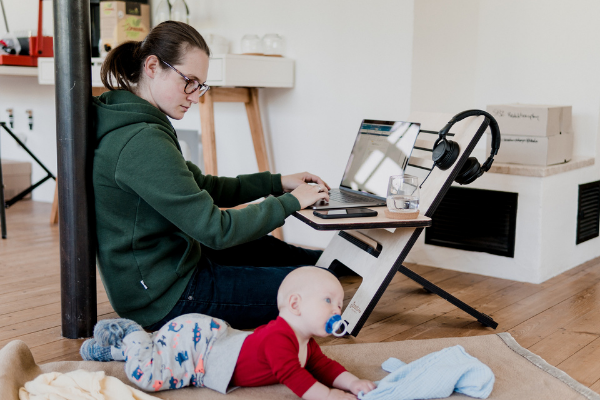There are few stones left unturned when it comes to working from home during COVID-19. What we can all agree on though, is ensuring staff are set up for success during mandatory (and non-mandatory) working from home (WFH) situations. The basics are easy - communication capabilities, equipment etc - but is there anything else HR departments and MDs can do to make the transition more seamless and...unexpectedly positive?
.png?width=600&name=Untitled%20design%20(17).png)
Usually, a work from home policy is an agreement between employer and employee, containing clearly defined expectations and responsibilities for employees whilst they work from the comfort of their home. Right now we’re seeing plenty of flex from HR Managers and business leaders regarding their WFH policies, attempting to mitigate the absence of daily face-to-face interaction and general office-based nuances - like Linda’s ‘You Don’t Have To Be Mad To Work Here But It Helps’ mug, or those weird noises Derek from IT makes with his nose...
Plenty of HR departments will be treating the situation like normal remote working, rightly or wrongly. Some policies will already have the necessary robustness to compensate for an extended WFH period. Here are two absolute basics:
- Make sure your staff are ok, first and foremost. Don’t assume it’s all good in the hood; we’re all fighting our own personal battles and a global pandemic isn’t the most welcome accompaniment.
- Ensure you’re equipped to communicate with your staff effectively. Usage of Microsoft Teams jumped 70% earlier this year. Slack saw similar uptake levels. Human interaction makes a critical difference to peoples’ daily lives.
Don’t forget that working from home is a flexible arrangement that needs to work for your staff as well as the business. Staff are adjusting to the new normal, just like you and your business.
Working in the recruitment and HR industry, we’ve got the inside track when it comes to your WFH policies. So, let’s hear about some slightly more alternative policies...
Double-stacked flexi-time
We’re seeing some HR departments offer staff an added layer of flexibility, to compliment their WFH policy. As well as working from home, businesses are also able to boost productivity by allowing staff to schedule their work during their individual “most productive” times of the day. When you think about it, this really does make sense - especially when you align the thinking to the research conducted by project management software company Redbooth, which found that productivity among office workers worldwide is at its highest point at 11 a.m., and plummets completely after 4 p.m.

So why don’t we all align our WFH policies in this way? The added complication of family life/schedules comes in to play here too. Businesses are beginning to cotton on to the fact that their employees have a finite amount of quality work they can actually get through in a day, whilst they juggle home learning for their kids and the plumber knocking the door at the most inopportune time. Instead of basing productivity on the amount of hours worked, perhaps it’s high-time businesses looked at the amount of work completed by their staff, and based their working hours on this.
Self-assessed productivity
The responsibility to ‘do a good job’ shouldn’t just fall to employers. Your employees will have an equal share of strengths and weaknesses within their skillset, however we probably don’t spend enough time and focus on analyzing how their skills impact the business. Some staff might struggle to stay productive at home, but putting the onus on them to manage their productivity will allow you to focus on being more efficient.
As a business leader, if you’re getting hints that your team is duplicating each other's efforts or that staff aren’t making the most of the working day then it’s probably time to hand over some responsibility to them to communicate and measure their own output. We spoke to an anonymous client last week who had done exactly that:
"It’s actually been a massive relief to encourage self-assessed productivity. It makes sense - only the employee involved can really do anything about a drop in productivity. I can email or Teams my staff about productivity until I’m blue in the face, but I’m in charge of my own productivity so why shouldn’t they be? The younger generation are actually really good at self-reflection and analyzing their impact so I would really recommend tapping into these kinds of traits.”“
Upskilling program
We’ve all had to come to terms with the inauspicious truth that none of us know what happens next to the global economy and job market. You won’t find smart business leaders resting on their laurels during this period, they’ll be strategically planning the next move...
Last week a client mentioned that while onboarding remotely and WFH, they were also offering complimentary upskilling and reskilling programs to new and existing employees. It’s not particularly unusual for employers to provide professional development, however feedback from candidates and employees tells us these opportunities are rather elusive, for one reason or another.
.png?width=600&name=Blog%20images%20(1).png)
Making a pledge to develop employees whilst they work from home shows staff you care about their careers AND their futures, should the worst happen. In the short-term as a business leader, you’ll boost morale during a tricky period, and be making the most of an upskilled workforce. If you’ve recently had to implement a hiring freeze but require specific expertise then think about reskilling as a means of acquiring it - it shows you have faith in your workforce and it’s cheaper, more often than not.
Promoting good mental wellbeing
‘Mental Wellbeing’ - we’ve all heard this banded about on social media platforms and it’s a permanent fixture at most industry related trade shows, but how important is it in the context of WFH? Stats from the Labour Force Survey found that 12.8 million working days were lost due to work-related anxiety, stress and depression. High figures of absence resulting in missed opportunities, slumping sales and declining growth.
.png?width=600&name=Blog%20images%20(2).png)
Remote working provides opportunities for staff to balance their everyday lives alongside their work commitments, and mitigates those everyday workplace stresses such as the daily commute, awkward boardroom meetings or bumping into that colleague who leaves the funny smell in the lift. Whatever stresses Steve out and distracts him from the work at hand, is now omitted via WFH policies and you, the employer, are able to keep those workplace stresses to a minimum, supporting your staff to keep a healthy mindset.
It’s no longer enough to just ask staff to look after their mental wellbeing. We must invest in the necessary training and activities which improve our state of mind, and then ensure it’s company policy. We need to signpost, and provide the material, content and resource which aims to look after our staff.
Semi-mandatory socials
It sounds severe, but it’s not really if it’s approached pragmatically. Usually, people don’t need inviting twice when it comes to a work social but there are all manner of things to consider here: family, religion and personal and mental health etc. Co-located offices provide lots of hidden opportunities for kitchen chat and general office interaction. You can go for a walk with a colleague to get some lunch. You can get drinks on Friday after work with your work bestie. When you sit and think, does a day go by that you don't have face-to-face, social interaction with your work colleagues? Probably not.

The landscape changes slightly for remote team activities, and you do have to be more intentional about this. Instead of organising a drinking sesh which inevitably turns into Never Have I Ever, try a pub quiz. What about a talent show? Have you thought about a movie night? For the more intellectual bods, you might want to consider running a virtual book club.
“A company I used to work for based in the United States but with operations all over the world ran an online talent show, which was a great way to cross the international divide and gain some cultural enrichment. We saw a small-time contortionist from our China office and a guy from Croatia who could solve a Rubik’s cube in under 10 seconds. Going to work isn’t just about ‘the work’, it’s also about linking up, finding common ground. I don’t think that should stop just because we’re at home!”“
We’re hearing echoes that remote work is actually improving social lives AND skills because it forces folk to be intentional about doing things together and over a different medium. Try it out!
Working from home can be frustrating for staff. Kids do scream and make special guest appearances on work calls, the neighbour will likely attempt to build what sounds like a funfair in their front room and the dog will almost certainly be sick over a work laptop. What’s important for HR departments and business leaders is to ensure the transition from the office to home is fluid and as wholesome as possible.
.png?width=206&height=60&name=Untitled%20design%20(31).png)




